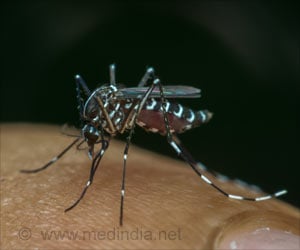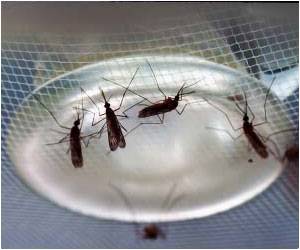Fungi that naturally infect mosquitoes can be made more deadly to control and kill these insects. The fungus can be engineered to produce multiple toxins.
- Mosquito resistance to chemical insecticides remains the major cause of failure to effectively control mosquito-borne diseases such as malaria.
- Genetically altered fungi capable of producing lethal toxins when the fungal spore comes in contact with mosquito can kill them, thus acting as biological pesticides.
Why Genetically Altered Fungi May Be Superior to Chemical Pesticides
According to the World Health Organization, resistance to chemical pesticides is one of the chief causes for inadequate mosquito control. The research team hoped to overcome this by developing a biological pesticide that would be effective in destroying disease transmitting mosquitoes. To this end, the team employed the fungus Metarhizium pingshaensei, which naturally infects mosquitoes. The fungus infects Anopheles gambiae and Aedes aegypti mosquitoes. When the fungal spore comes in contact with the mosquito, the spores germinate and penetrate into the mosquito, destroying it from inside out.TOP INSIGHT
Engineered fungal spores are highly effective and lethal against disease carrying mosquitoes but safe for humans and other beneficial insects such as honey bees.
According to Raymond St. Leger, a Distinguished University Professor in the UMD Department of Entomology and senior author of the study, "Unlike chemical insecticides that target only sodium channels, many spider and scorpion toxins hit the nervous system's calcium and potassium ion channels, so insects have no pre-existing resistance."
Testing the Genetically Altered Fungi in Mosquitoes
- The genetically modified fungi were tested on wild mosquitoes that were caught in Burkina Faso and were insecticide resistant.
- The altered fungi killed the mosquitoes much faster and more efficiently than the unmodified strain.
- The most effective strains were those that produced a combination of spider and scorpion venom, derived from the North African desert scorpion Androctonus australis and another derived from the Australian Blue Mountains funnel-web spider Hadronyche versuta.
- The scientists also ensured that the fungal toxin is not released into the environment by inserting a genetic switch into the fungus that turns on toxin production only when the fungus is within the blood of the insect.
- Additionally, the authors have determined and made sure that the fungal spores do not harm or destroy non-target beneficial insects such as honey bees by exposing them to spore coated fabric (passive method) and spraying fluid in which the spores were suspended (active method); it was observed that the honey bees did not die even after 2 weeks of observation.
- Both these toxins have been approved for insecticidal purpose by the Environmental Protection Agency.
"In this paper, we report that our most potent fungal strains, engineered to express multiple toxins, are able to kill mosquitoes with a single spore," said Brian Lovett, a graduate student in the UMD Department of Entomology and a co-author of the paper. "We also report that our transgenic fungi stop mosquitoes from blood feeding. Together, this means that our fungal strains are capable of preventing transmission of disease by more than 90 percent of mosquitoes after just five days."
Current and Future Plans of Testing the Biological Pesticide
- The recent findings have encouraged the authors to perform on-field testing on mosquitoes in Burkina Faso. Currently they are testing the insecticide within a custom made enclosure made of netting.
- Also, they are testing the insecticide on insect species related to mosquitoes such as midgets and gnats to determine whether non-target insects are affected or not.
- Finally, the team plans to release the spores in the open on wild mosquito populations.
"This is our first in-depth study of the effects toxin-expressing fungi have on mosquitoes, beyond their ability to kill faster. This is also our broadest characterization of our arsenal of insect-killing spider and scorpion toxins," Lovett said. "Our results directly extend our understanding of how these technologies may be used in the field against mosquito pests."
References:
- Etienne Bilgo, Brian Lovett, Weiguo Fang, Niraj Bende, Glenn F. King, Abdoulaye Diabate, Raymond J. St. Leger. Improved efficacy of an arthropod toxin expressing fungus against insecticide-resistant malaria-vector mosquitoes. Scientific Reports, 2017; 7 (1) DOI: 10.1038/s41598-017-03399-0
 MEDINDIA
MEDINDIA




 Email
Email









